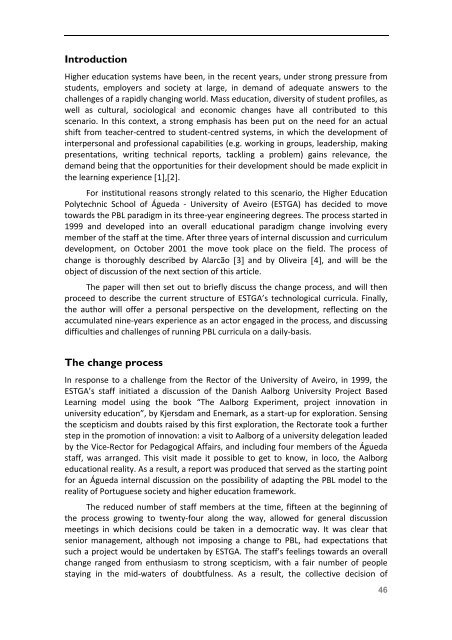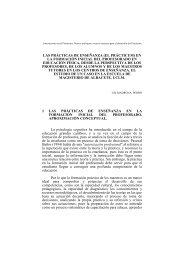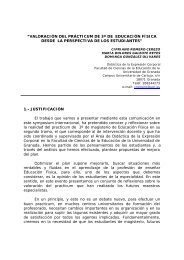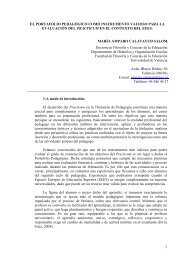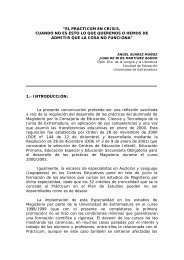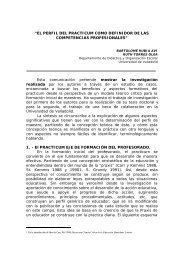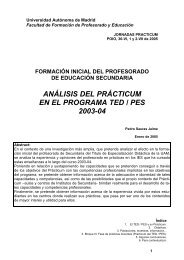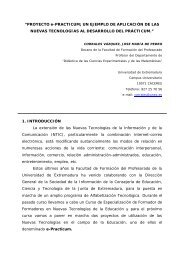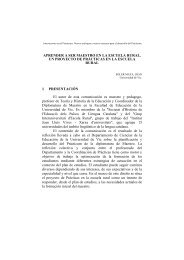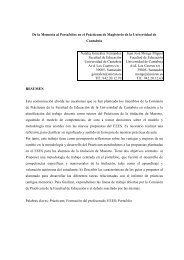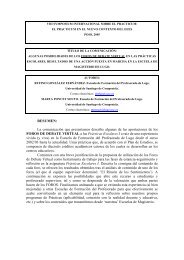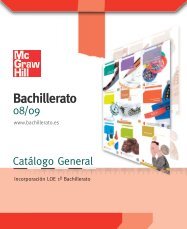descarga completa del vol. 9 nº 1 - REDU. Revista de Docencia ...
descarga completa del vol. 9 nº 1 - REDU. Revista de Docencia ...
descarga completa del vol. 9 nº 1 - REDU. Revista de Docencia ...
Create successful ePaper yourself
Turn your PDF publications into a flip-book with our unique Google optimized e-Paper software.
IntroductionHigher education systems have been, in the recent years, un<strong>de</strong>r strong pressure fromstu<strong>de</strong>nts, employers and society at large, in <strong>de</strong>mand of a<strong>de</strong>quate answers to thechallenges of a rapidly changing world. Mass education, diversity of stu<strong>de</strong>nt profiles, aswell as cultural, sociological and economic changes have all contributed to thisscenario. In this context, a strong emphasis has been put on the need for an actualshift from teacher‐centred to stu<strong>de</strong>nt‐centred systems, in which the <strong>de</strong>velopment ofinterpersonal and professional capabilities (e.g. working in groups, lea<strong>de</strong>rship, makingpresentations, writing technical reports, tackling a problem) gains relevance, the<strong>de</strong>mand being that the opportunities for their <strong>de</strong>velopment should be ma<strong>de</strong> explicit inthe learning experience [1],[2].For institutional reasons strongly related to this scenario, the Higher EducationPolytechnic School of Águeda ‐ University of Aveiro (ESTGA) has <strong>de</strong>ci<strong>de</strong>d to movetowards the PBL paradigm in its three‐year engineering <strong>de</strong>grees. The process started in1999 and <strong>de</strong>veloped into an overall educational paradigm change in<strong>vol</strong>ving everymember of the staff at the time. After three years of internal discussion and curriculum<strong>de</strong>velopment, on October 2001 the move took place on the field. The process ofchange is thoroughly <strong>de</strong>scribed by Alarcão [3] and by Oliveira [4], and will be theobject of discussion of the next section of this article.The paper will then set out to briefly discuss the change process, and will thenproceed to <strong>de</strong>scribe the current structure of ESTGA’s technological curricula. Finally,the author will offer a personal perspective on the <strong>de</strong>velopment, reflecting on theaccumulated nine‐years experience as an actor engaged in the process, and discussingdifficulties and challenges of running PBL curricula on a daily‐basis.The change processIn response to a challenge from the Rector of the University of Aveiro, in 1999, theESTGA’s staff initiated a discussion of the Danish Aalborg University Project BasedLearning mo<strong><strong>de</strong>l</strong> using the book “The Aalborg Experiment, project innovation inuniversity education”, by Kjersdam and Enemark, as a start‐up for exploration. Sensingthe scepticism and doubts raised by this first exploration, the Rectorate took a furtherstep in the promotion of innovation: a visit to Aalborg of a university <strong><strong>de</strong>l</strong>egation lea<strong>de</strong>dby the Vice‐Rector for Pedagogical Affairs, and including four members of the Águedastaff, was arranged. This visit ma<strong>de</strong> it possible to get to know, in loco, the Aalborgeducational reality. As a result, a report was produced that served as the starting pointfor an Águeda internal discussion on the possibility of adapting the PBL mo<strong><strong>de</strong>l</strong> to thereality of Portuguese society and higher education framework.The reduced number of staff members at the time, fifteen at the beginning ofthe process growing to twenty‐four along the way, allowed for general discussionmeetings in which <strong>de</strong>cisions could be taken in a <strong>de</strong>mocratic way. It was clear thatsenior management, although not imposing a change to PBL, had expectations thatsuch a project would be un<strong>de</strong>rtaken by ESTGA. The staff’s feelings towards an overallchange ranged from enthusiasm to strong scepticism, with a fair number of peoplestaying in the mid‐waters of doubtfulness. As a result, the collective <strong>de</strong>cision of46


